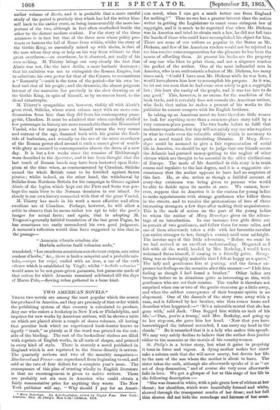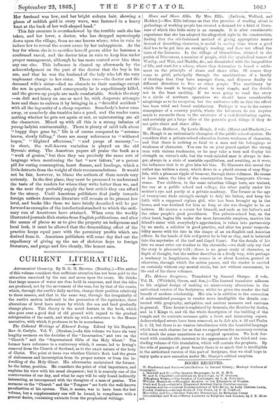TWO AMERICAN NOVELS.*
THESE two novels are- among the most popular which the season has produced in America, and they are precisely of that order which the publishing system of that country is calculated to produce. Any one who enters a bookshop in New York or Philadelphia, and inquires for new works by American authors, will be shown a table on which are placed about a couple of dozen volumes, all having that peculiar look which an experienced book-hunter knows to signify "trash," as plainly as if the word was printed on the out- side of the binding. The rest of the booksellers' shelves are filled with reprints of English works, in all sorts of shapes, and printed in every kind of style. There is scarcely a novel published in England which is not reprinted in the States directly it arrives. The quarterly reviews and two of the monthly magazines— Blackwood and Fraser—are reproduced from beginning to end, and sold at the rate of four dollars for a complete year's issue. The consequence of this plan of trusting wholly to English literature is that no encouragement is given to native writers. There are probably not six men in America who could obtain a fairly remunerative price for anything they wrote. The New York publisher will say, " Why should I pay for an Amen- * Mary Brandegee. An Autobiography, edited by Cu)ler Pule. New York:
Carleton. 1855. Bt. Nee York: Carleton. 1865.
can novel, when I can get a much .better one from England for nothing?" Thus no one has a greater interest than the native writer in getting the Legislature to enact some stringent law of copyright, and it is much to be regretted that when Mr. Dickens was in America and tried to obtain such a law, he did not fall into the lands of those who could have accomplished his object for him. There are none of our writers so popular in the States as Mr. Dickens, and few of his American readers would not be rejoiced to see him receive some compensation for the pleasure he has been the means of affording them. At present his books are the property of any one who likes to print them, and not a sixpence reaches the pocket of the author. One of the most influential men in America, who is an enthusiastic admirer of Mr. Dickens, has many times said, "Could I have seen Mr. Dickens while he was here, I would have shown him how to accomplish his purpose. As it was, he let out too soon that he had come over solely to get a copyright. law ; this hurt the vanity of the people, and it was too late to do any good." This, however, is no excuse for the condition of the book trade, and it certainly does not console the American author, who finds that unless he makes a present of his works to the publisher he cannot compete with his English brethren.
In taking up an American novel we have therefore little reason to look for anything more than a common-place story told by a very common-place person. The two books before us fulfil that moderate expectation, but they will not satisfy any one who requires in what he reads even the tolerable ability which is necessary to push a novel round the circulating libraries. If Mary Bran- cleyee could be assumed to give a fair representation of social life in America, we should be apt to judge that our friends across the Atlantic had pursued money-getting to the neglect of other virtues which are thought to be essential in the older civilizations of Europe. The mode of life described in this story is in truth coarse and repulsive to the last degree, and it is a suggestive cir- cumstance that the author appears to have had no suspicion of this fact. He, or she, writes as though a faithful account of every-day existence was being given to persons who would be able to decide upon its merits at once. We cannot, how- ever, suppose that in America it is the custom for young ladies to make appointments with strange gentlemen who follow them in the streets, and to receive the protestations of love of these interesting strangers a few days after making their acquaintance. This is the mode of action on the part of the young ladies to whom the author of Mary Brandeyee gives us the advan- tage of an introduction. Iu one instance two girls drive out in pursuit of two gentlemen, and follow them for some miles, and one of them afterwards takes a ride with her favourite cavalier (an entire stranger to her, though a cousin) until near midnight. The heroine says of this little adventure, "Before we came in we had arrived at an excellent understanding. Disgusted as I felt with all the world, headed by Mrs. Berkeley, I would have welcomed Satan himself, if coming in a friendly guise. Every- thing was so thoroughly amicable that I felt as happy as a queen." The lady and gentleman kiss at parting, and the former ex- presses her feelings on the occasion after this manner:—" I left him feeling as though I had found a brother." Other ladies are brought before us in situations quite as interesting as this, with gentlemen who are not their cousins. The reader is therefore not surprised when one or two of the gentle creatures go a little awry, and when the mildest consequence of their buoyant spirits is an elopement. One of the damsels of the story runs away with a. man, and is followed by her brother, who thus comes home and describes what happened :—" It's a miserable mortal that she has gone with,' said Jack. 'Dan flogged him within an inch of his life.'—' Dan, you're a trump,' said Mrs. Berkeley, and going up
to her step-son, she gave him her hand. Now that you have horsewhipped the infernal scoundrel, I can carry my head in the clouds.'" Be it remarked that it is a lady who makes this speech. We may very safely decline to believe that the author does justice either to the manners or the morals of his countrywomen.
St. Philip's is a better story, but what it gains in propriety it loses in force and vigour. A dying mother makes her sister take a solemn oath that she will never marry, but devote her life to the care of the son whom the mother is about to leave. The sister takes the oath, although she afterwards speaks of it as "an act of deep damnation," and of course she very soon afterwards falls in love. We get a glimpse of her at this stage of her life ia the following description :— " She was dressed in white, with a pale green bow of ribbon at her throat; her shoulders, which were beautifully formed and white, showed through the transparent muslin of her dress ; and her full thin sleeves did not hide the roundness and fairness of her arms. gleam of reddish gold in every wave, was fastened in a heavy knot at the back of her well-shaped head."
This fair creature is overshadowed by the terrible oath she has taken, and her lover, a doctor, who has dropped mysteriously down upon the village, from no one knows where, tries in vain to induce her to reveal the secret cause by her unhappiness. As the boy for whom she is to sacrifice herself grows older he becomes a confirmed rascal, and the doctor tries in vain to keep him under proper management, although he has more control over him than any one else. This influence is cleared up afterwards by the acknowledgment on the part of the doctor that the boy is his son, and that he was the husband of the lady who left the very unpleasant charge to her sister. These two—the doctor and the deceased wife's sister—find no obstacle to their marriage except the son in question, and consequently he is expeditiously killed, and the grown-up people are made comfortable. Such is the story —as dull and heavy an one as need be, with desperate attempts here and there to enliven it by bringing in a "dreadful accident" with all the ingenuity of a cheap reporter. Somebody's horse runs away, or somebody else tumbles into a pond, and the reader cares nothing whether he gets out again or not, so uninteresting are all
the characters. Mixed up with all this is a strong infusion of young-ladyish sentimentality. There is plenty of mild talk about
"happy days gone by," life is of course compared to "autumn
leaves, slowly falling," there are many references to "withered hopes," "blighted affections," "and pangs of memory,"—
in short, the well-known variation is played on the old Byronic string. The American papers all praise the book as a "work of genius," but then they use precisely the same sort of language when mentioning the last "new bitters," or a patent pill for curing consumption, heart disease, and lumbago, which a little detracts from the weight of their recommendations. It would not be fair, however, to blame the authors of these novels very seriously. In the first place, they must be presumed to understand the taste of the readers for whom they write better than we, and in the next they probably supply the beat article they can afford for the nfoney. Until American publishers deal justly towards foreign authors American literature will remain at its present low level, and books like these we have briefly described will be put forward as examples of the intellectual standard to which the ordi- nary run of Americans have attained. When even the weekly illustrated journals filch stories from English publications, and alter the names of places so as to give the property an indigenous and local look, it must be allowed that the demoralizing effect of the practice keeps equal pace with the pecuniary profits which are derived from it. American publishers will some day find out the expediency of giving up the use of skeleton keys to foreign literature, and purge and live cleanly, like honest men.































 Previous page
Previous page